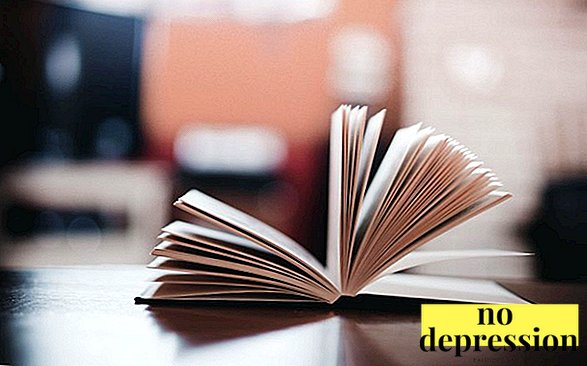 The Beck Depression Scale is a diagnostic and self-diagnostic tool that allows you to set the severity level of depressive disorder in both adults and adolescents from 13 years of age. The technique was developed in the middle of the 20th century by the American psychotherapist Aaron Beck.
The Beck Depression Scale is a diagnostic and self-diagnostic tool that allows you to set the severity level of depressive disorder in both adults and adolescents from 13 years of age. The technique was developed in the middle of the 20th century by the American psychotherapist Aaron Beck.
General information about the Beck scale
Aaron Beck worked for many years with people suffering from psychological problems. Based on the complaints and statements of his patients, the professor developed a test that includes 21 statements corresponding to the main signs of depression.
The test has been adjusted several times. The first publication was in 1961. The final version of the Beck scale was released in 1996.
Conventionally, the entire test is divided into two parts:
- Identifies the somatic signs of depression associated with the physical condition of the person. This is a sleep disorder, loss of appetite, noticeable fluctuations in weight and so on. The patient may not be aware that he has psychological disorders, but his body begins to give alarming signals;
- Demonstrates affective-cognitive symptoms that reflect the internal state of the patient. The main disorders are associated with brain functions - memory and perception impairment, fatigue, increased anxiety.
In the original version of the test, there are 4 possible answers for each item, which correspond to a score from 0 to 3. The answers are arranged in order of aggravating the psychological state of the respondent. After passing the test, the scores are summed up and, based on the results obtained, the severity level of the depression is determined.
Who can take the test
Beck can be tested by men and women of any age. An adapted version has been created for adolescents - for example, instead of questions about sexual life, statements have appeared that are related to the assessment of one's own appearance. Teen test includes only 13 points.
How to pass the test
There are several variations of the test. They differ in a slight reformulation. In different questionnaires items can be:
- numbered (version 1691)
- in the form of a question (the latest edition of the Beck scale) - "do you have a good appetite?"
- have a short name - "appetite", "sleep"
Regardless of the option chosen, passing the test is the same:
- You need to carefully familiarize yourself with the group of statements;
- Choose the answer that most accurately reflects your current state;
- Calculate the total number of points and compare with the proposed interpretation of the test.
Testing can be done both independently and in the presence of a specialist. The last option will give the most accurate results, since the expert will take into account the patient's individual characteristics - the level of his intellectual development, age and general emotional state.
Self-testing is based on the subjective assessment of their condition by the subjects.
On average, testing takes 15-20 minutes.
If several statements in the same group seem to be correct, the last option should be chosen. In the first versions of the scale Beck allowed the choice of several beliefs.
Beck's test
Carefully study the group of statements and select one statement.
1. (For adult and teen test)
- (0) I almost do not feel sad.
- (1) Sometimes I feel sad.
- (2) I often get discouraged.
- (3) I am very unhappy.
2. (For adult and teen test)
- (0) I am calm for my future.
- (1) I'm not sure about tomorrow.
- (2) I do not expect anything good.
- (3) I have no future.
3. (For adult and teen test)
- (0) Everything works out for me.
- (1) It seems to me that my friends are more successful than me.
- (2) There have been few victories in my life.
- (3) Everything falls out of my hands.
4. (For adult and teen test)
- (0) I am satisfied with my life, as before.
- (1) I have less joy.
- (2) Nothing pleases me.
- (3) I despise my life.
5. (For adult and teen test)
- (0) I have nothing to reproach.
- (1) Sometimes I feel guilty of other people's misfortunes.
- (2) I feel guilty most of the time.
- (3) I always feel guilty.
6. (For an adult)
- (0) I did not commit acts for which I could be punished.
- (1) Sometimes it seems to me that I deserve punishment.
- (2) I am constantly waiting for punishment.
- (3) I am already punished.
7. (For adult and teen test)
- (0) I consider myself a worthy person.
- (1) I lost faith in myself.
- (2) I dislike myself.
- (3) I'm a terrible person.
8. (For an adult)
- (0) I am not worse than others.
- (1) I am wrong more often than others.
- (2) I am ashamed of my actions and thoughts.
- (3) All the worst is happening because of me.
9. (For adult and teen test)
- (0) I want to live a long and happy life.
- (1) I think about suicide, but I am not going to do it.
- (2) I seriously think about suicide.
- (3) I will commit suicide as soon as the opportunity arises.
10. (For an adult)
- (0) I rarely cry.
- (1) At the moment I cry more often.
- (2) I'm crying all the time.
- (3) I can't cry, even when I feel like it.
11. (For an adult)
- (0) I don't think I became more irritable.
- (1) I get easily mad.
- (2) I am often annoyed.
- (3) I don’t care about things that used to make me angry.
12. (For adult and teen test)
- (0) I am interested in the lives of others.
- (1) I care less about the lives of others.
- (2) I don't care how other people live.
- (3) I absolutely do not care about other people's lives.
13. (For adult and teen test)
- (0) As before, I can not immediately make an important decision.
- (1) I became more likely to leave urgent business for later.
- (2) I can hardly make decisions.
- (3) I am not able to solve something.
14. (For adult and teen test)
- (0) I am pleased with my appearance.
- (1) It seems to me that I am less attractive now.
- (2) My appearance has changed for the worse.
- (3) I hate to look in the mirror.
15. (For adult and teen test)
- (0) My working capacity remained the same.
- (1) I have to force myself to do something.
- (2) I cannot tune in to work and important matters.
- (3) I am not able to do anything.
16. (For an adult)
- (0) I sleep as usual.
- (1) My dream has become worse.
- (2) I can wake up several times a night.
- (3) I hardly sleep.
17. (For adult and teen test)
- (0) My energy is enough for the whole day.
- (1) I began to tire faster.
- (2) Any activity deprives me of strength.
- (3) I can not do anything because of overwork.
18. (For adult and teen test)
- (0) I eat as usual.
- (1) I began to eat worse.
- (2) I eat by force.
- (3) Food makes me disgusted.
19. (For an adult)
- (0) My weight has not changed.
- (1) I lost about 2 kg.
- (2) I lost 5 kg.
- (3) I am very thin.
20. (For an adult)
- (0) My health does not make me afraid.
- (1) I am increasingly worried about my health.
- (2) I find it hard to think about anything other than my health problems.
- (3) I constantly think only about my illnesses.
21. (For an adult)
- (0) Questions of a sexual nature worry me no less than usual.
- (1) I think about sex less and less.
- (2) I have practically no interest in sex life.
- (3) I completely stopped being interested in sex.
Detailed interpretation of the results
The higher the accumulated points, the more severe the degree of depression. For an adult survey, you can score from 0 to 63 points.
You scored from 0 to 9
You have no signs of depression or they are minor and temporary. Your emotional state does not cause concern. If the mark is close to 9, then it is recommended to devote more time to rest in order to prevent the development of a depressive state.
You scored from 10 to 15
This indicates the first symptoms of depression. Your condition is subdepressive, which is not a psychopathology and does not indicate a social disorder. With such results, the patient is advised to consult with a specialist to check the situation.
You scored from 16 to 19
You are in a moderate depressive state. In contrast to the mild form of depression, in this situation, the characteristic signs of mental problems appear much more often. Such people are more sad, tired faster than usual, lose interest in social life and have a constant feeling of guilt. Beck Depression Scale is designed to identify this particular category of people.
You scored from 20 to 29
The result indicates the presence of moderate depression. Such patients complain of poor appetite and loss of sleep. Not only emotional disruptions occur in their bodies, but also physical ones. At this stage, the hormone of happiness ceases to be produced. Trying to replenish it, people often resort to alcohol and drugs, which leads to addiction or death. This condition of the patient needs urgent treatment. According to statistics, about 70% of people with similar symptoms are trying to end their lives.
You scored from 30 to 63
Critical indicators show signs of deep depression. Patients with similar psychological problems have a constant oppressive state. They hate themselves and feel useless. Such people are subject to dramatic emotional change. They do not represent their future, they easily fall into hysterics, they are prone to suicide and violence. This category should be under the constant supervision of a specialist, in order to avoid negative consequences.
Interpretation of the teen test
For Beck’s teen test, which has just 13 points, you can score 39 points.
- From 0 to 9 - the emotional state is normal;
- 10 to 19 - mild depression;
- From 19 to 22 - characteristic signs of subdepression;
- From 23 to 39 - severe depression.
Conclusion
Anyone can take the Beck test, regardless of the emotional state. This will help identify the initial forms of depression or the latent manifestation of psychological problems. Our site recommends that you immediately seek psychological help if you have found the first signs of depression and begin treatment.
We also recommend that you read the following articles:



